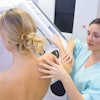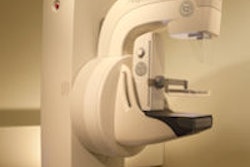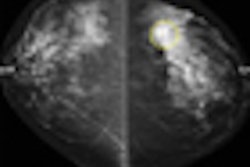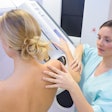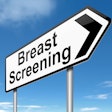A new study published online today in Cancer has found that breast cancer patients with dense breasts have a four times higher risk of recurring malignancy than women with less-dense breasts. Patients with dense breast tissue might be directed to radiation therapy due to their elevated risk levels, the study suggests.
In recent years, mammographically dense breasts -- comprising less fat and more connective, duct-lining, and glandular tissue -- have made news as a significant risk factor for breast cancer. Reports initially focused on how dense breasts often masked the appearance of tumors; next came the realization that as-yet undefined biological influences could be at play.
In this week's study, a team from the Women's College Research Institute in Toronto led by Dr. Steven Narod reviewed the medical records of 335 patients who had undergone lumpectomy for breast cancer -- some as many as 20 years ago, when the postlumpectomy treatment protocol did not include radiation.
Investigators monitored the patients for cancer recurrence and compared recurrence with mammographic breast density, categorized as low density (< 25% dense tissue), intermediate density (25% to 50% dense tissue), or high density (> 50% dense tissue).
The study found that over 10 years, women in the highest breast density category had a 21% chance of cancer recurrence, compared with a 5% chance among women in the lowest category. The difference in the recurrence rates at 10 years was even more pronounced for women who did not receive radiation. In those women, 40% with high-density breast tissue had a recurrence compared with none of the patients with low density.
The study is unique in its focus on breast density in women with cancer rather than asymptomatic women undergoing screening, according to Dr. Christy Russell, a medical oncologist, associate professor, and co-director of the breast cancer center at the University of Southern California Keck School of Medicine, who was not associated with the study but chairs the breast cancer advisory committee for the American Cancer Society (ACS).
"This report is completely different from previous studies on breast density. All data to this point has been around women who had never had breast cancer, based on screening mammograms," Russell said. "We've never seen this kind of data. The breast density was independent of age and all other factors."
Interestingly, it will be difficult to replicate those findings in current patient populations, as radiation is now standard practice following lumpectomy.
"It wasn't until the mid-80s that radiation was found to significantly lower the risk of cancer recurrence," Russell said. "This patient group goes through that period of time when some women were not receiving radiation therapy."
However, several salient points come out of this study: First, the authors note that the women with low breast density (comprising 30% of the study) may not need radiation after surgery, though they issue a caveat about the small sample size (just 34 women had low-density breasts, no radiation therapy, and no disease recurrence).
Also, there is a new emphasis on changing how radiation therapy is delivered. Investigations into partial- versus whole-breast irradiation should take breast density into account, the authors say, with similar baseline distributions of breast densities in both treatment arms. And while the Toronto researchers focused on invasive breast cancer, questions remain around treatment of ductal carcinoma in situ (DCIS).
"In DCIS, it is still controversial whether radiation is useful," Russell said. "Can we predict them developing another cancer based on breast density? That's an interesting future research question."
By Alexandra Weber Morales
AuntMinnie.com contributing writer
November 9, 2009
Related Reading
Radiation for early breast cancer: 3 weeks may be as good as 5 to 7, November 5, 2009
Follow-up after grade 1 breast cancer may not be needed, August 25, 2009
Risk of breast cancer after radiotherapy in childhood quantified, July 21, 2009
Copyright © 2009 AuntMinnie.com

